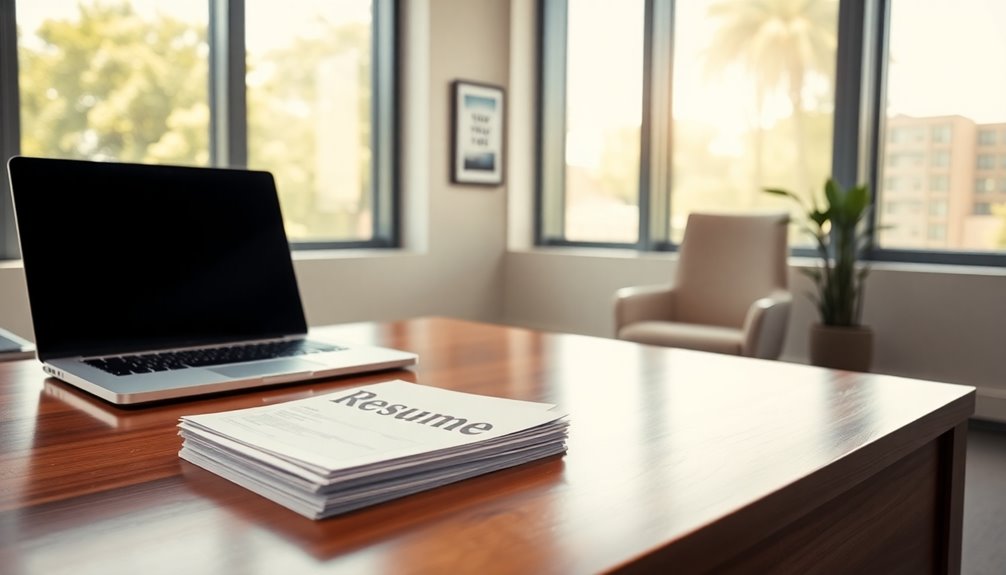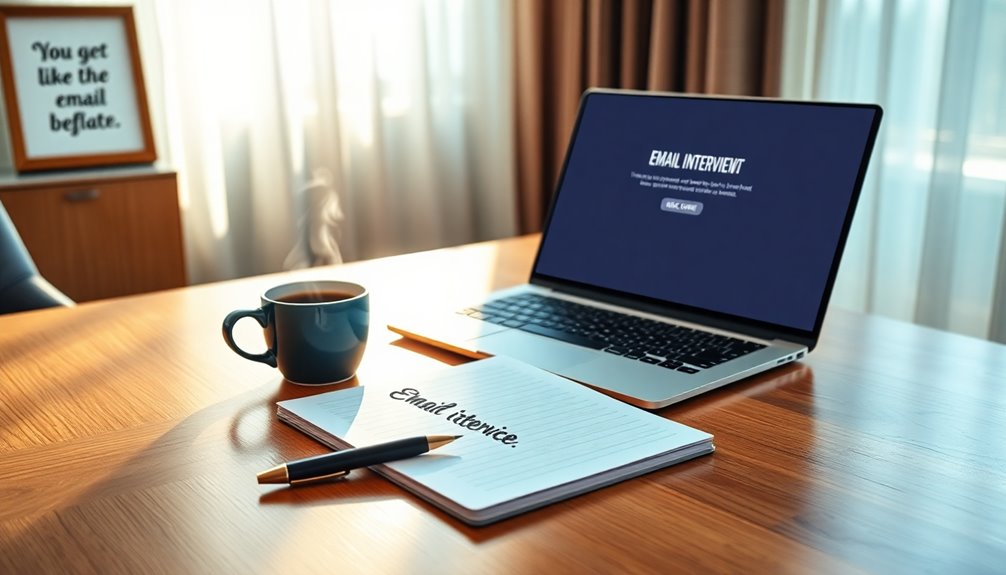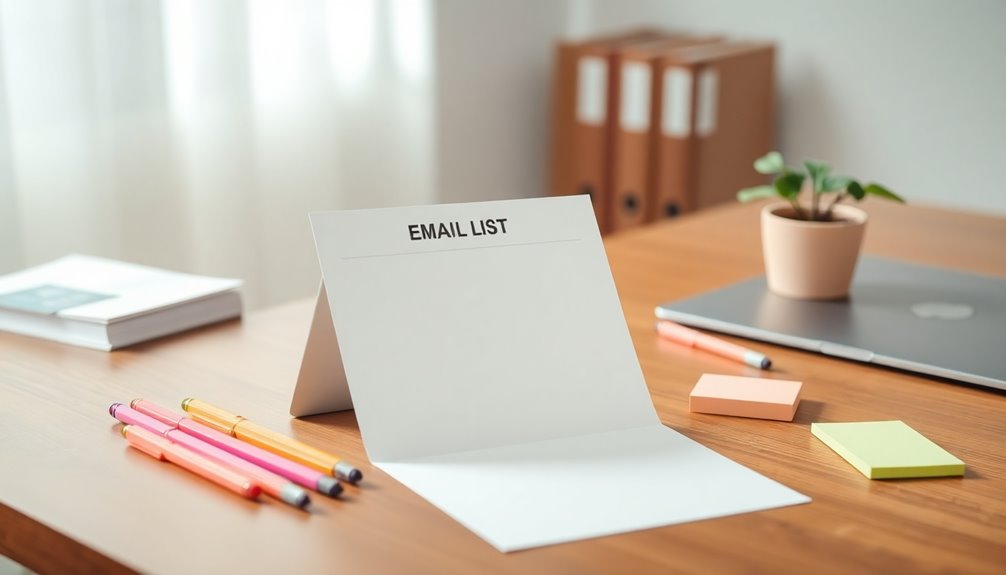If you're facing an interviewer no-show, a professional email can help maintain your company's reputation and show respect for your candidate's time. Start with a warm greeting and express your regret about the missed meeting. Acknowledge the situation and offer to reschedule, proposing a few new times while inviting their suggestions as well. Keep the tone empathetic and clear, ensuring your subject line reflects the purpose of the email. This approach reinforces your commitment to the candidate experience. Discovering effective templates and tips can enhance your communication strategy even further.
Key Takeaways
- Acknowledge the candidate's time and express sincere regret for the missed interview to maintain professionalism.
- Offer multiple rescheduling options, showing flexibility and commitment to the candidate's experience.
- Use a clear and concise subject line that includes the company name and the purpose of the email.
- Maintain an empathetic tone throughout the message to foster trust and rapport with the candidate.
- Clearly outline next steps and invite the candidate to share their availability for rescheduling.
Introduction

In today's competitive job market, it's not uncommon for interviewers to miss scheduled meetings. When this happens, sending an email to address the no-show is crucial for maintaining professionalism. Your goal is to acknowledge the missed interview while expressing empathy and understanding.
Life can be unpredictable, and recognizing that unexpected events occur helps to build a positive rapport with the candidate.
Start your email with a friendly greeting and a clear acknowledgment of the no-show. It's important to politely inquire about the reason for the missed interview, which shows you're genuinely interested in the candidate's situation.
Reiterate your interest in their application, as this emphasizes that you value their time and effort.
To facilitate a smooth rescheduling process, provide specific options for new interview times. This clarity demonstrates your flexibility and willingness to accommodate the candidate's schedule.
By maintaining a professional tone throughout your email, you reinforce your commitment to a positive candidate experience, even in the face of a scheduling mishap.
Ultimately, this approach helps to create a favorable impression of your organization, ensuring candidates feel respected and valued.
Builds Candidate Trust

Acknowledging a missed interview with empathy not only helps maintain professionalism but also builds trust with candidates. When you follow up promptly after an interviewer no-show, you show that you value the candidate's time. This communication reassures them that their application is still a priority, fostering a sense of reliability in your recruitment process. Additionally, candidates appreciate organizations that demonstrate commitment to effective communication, as it reflects positively on the overall experience.
By expressing understanding for the situation, you demonstrate respect for the candidate's experience, even if things didn't go as planned. This approach creates a positive environment where candidates feel appreciated, reinforcing their desire to continue with the application process. Offering to reschedule the interview further emphasizes your commitment to them, indicating that you see potential in their abilities.
Maintaining a courteous and professional tone throughout your email is crucial. It helps create an atmosphere of trust, ensuring candidates feel secure in their interactions with your organization. Additionally, addressing setbacks with open and honest communication can significantly enhance the candidate's perception of your organization.
Clear communication about the next steps can boost their confidence and eagerness to engage further. In this way, you not only address the missed interview but also strengthen candidate trust, paving the way for a more robust recruitment relationship.
Clear Subject Line

A clear subject line is essential for effective communication, especially when addressing a missed interview. When you're crafting no-show emails, it's important to maintain professionalism and clarity. A subject line like "Follow-Up on Missed Interview for [Job Title]" succinctly conveys the purpose of your message.
Including the company name can help the candidate quickly identify the context, which enhances their understanding. Incorporating specific details, such as the scheduled date and time of the interview, can jog the candidate's memory and provide valuable context.
This not only clarifies your intent but also demonstrates your attention to detail. A well-crafted subject line sets the tone for the email and encourages a prompt response from the candidate.
Crafting an Apology Email

Missing an interview can be frustrating for both you and the candidate, so it's crucial to address the situation with a thoughtful apology email.
Start by acknowledging the missed interview and expressing your sincere regret for any inconvenience caused. Transparency is key, so briefly explain the reason for the no-show, whether it was due to scheduling conflicts or unforeseen emergencies.
Next, offer a sincere invitation to reschedule the interview. Provide multiple options for dates and times that accommodate the candidate's availability, showing your commitment to making this right.
Maintaining a professional tone throughout the email is essential; this helps the candidate feel valued despite the oversight.
As you wrap up the email, reassure the candidate of your continued interest in their application. Acknowledge any confusion or frustration they might've experienced due to the situation.
Ending on this note not only emphasizes your respect for their time but also reinforces your desire to move forward positively. By crafting an apology email with sincerity and professionalism, you can mend the situation and keep the lines of communication open for future discussions.
Pro Tips for Maximizing Impact

Crafting an effective follow-up email after a missed interview goes beyond just an apology; it's an opportunity to leave a positive impression on the candidate. Start with a warm and professional greeting, acknowledging the situation while expressing your understanding of unforeseen circumstances. This sets a respectful tone from the get-go.
Next, clearly state the purpose of your email: to follow up on the missed interview and to know if the candidate is still interested in the position. This clarity reassures them that their candidacy is valued.
Offer flexible options for rescheduling. Let the candidate choose a convenient time that works for them, which shows your commitment to accommodating their schedule. This is an important thing to consider, as it reflects your company culture.
Maintain an empathetic tone throughout your message, reinforcing your dedication to their experience.
Conclude with a reminder of the next steps and invite them to reach out with any questions or concerns. This fosters open communication and keeps the door open for future interactions, ensuring the candidate feels respected and valued.
Common Mistakes to Avoid

When following up on a missed interview, you should steer clear of using a blameful tone, as it can alienate the candidate and hinder future communication. It's important to keep in mind that emotional alignment can significantly impact how both parties perceive the situation, leading to a more constructive outcome. Remember, no-shows can disrupt your hiring process, but they might've had a valid reason, like a personal emergency. Instead of making assumptions, proactively communicate your interest in rescheduling the interview.
Aim to send the follow-up email within 24 hours of the missed interview to maintain engagement. Acknowledge that they're still interested in the position, and express your willingness to accommodate their schedule. By maintaining a positive mindset, you can help facilitate a smoother rescheduling process.
Keep your message concise and focused on the goal: rescheduling the interview without unnecessary details that could distract from the main point. It's also crucial to avoid overly formal or complex language. A friendly and approachable tone can foster positive rapport and encourage an open dialogue. Additionally, utilizing data-driven marketing strategies can help streamline your hiring process by ensuring you attract the right candidates.
End your email by expressing that you look forward to hearing from them soon. This approach not only keeps the lines of communication open but also reinforces your professionalism and understanding, which can leave a lasting positive impression on the candidate.
Candidate No-Show Email Template

If a candidate misses their interview, it's essential to address the situation promptly and with empathy. A well-crafted candidate no-show email template can help you communicate effectively.
Start by acknowledging the missed interview and expressing concern for the candidate's well-being. This shows you're considerate and professional.
In your email, maintain a professional tone while inquiring about their continued interest in the position. Let them know you value their application and would like to understand what happened.
Offer them an opportunity to reschedule, making it clear that you're still interested in speaking with them if they're as well.
Include a clear call to action by proposing new interview times or inviting them to suggest their availability. This can facilitate the rescheduling process and keep the lines of communication open.
If the candidate doesn't respond or indicates they're no longer interested, it's crucial to communicate the next steps. This might involve moving forward with other candidates, so they know where they stand.
Final Thoughts

Navigating the complexities of interview no-shows requires a thoughtful approach that reinforces your organization's professionalism. You want to ensure that every candidate feels valued, even when plans fall through. In your follow-up, consider sending a personalized email that acknowledges their situation and expresses your hope everything is well on their end. This simple gesture can foster a positive impression and encourage open communication.
When addressing a no-show, it's essential to maintain a professional tone. Let the candidate know you understand that unforeseen circumstances can arise, and offer flexible options to reschedule the missed interview. This shows your adaptability and commitment to making the process work for both parties.
Utilizing email templates can streamline your response while ensuring consistency across your recruitment team. Having a well-crafted template ready allows you to act promptly, reinforcing your company's image and professionalism.
Moving forward, remember that how you handle these situations speaks volumes about your organization. By prioritizing respect and understanding, you can turn a missed opportunity into a positive experience for the candidate, enhancing your overall recruitment strategy.
Frequently Asked Questions
What to Write in an Email if the Interviewer Doesn T Show Up?
When an interviewer doesn't show up, express understanding of unforeseen circumstances. Politely mention your continued interest, inquire about rescheduling, and share your availability. Thank them for their time, reinforcing your enthusiasm for the position.
How Do You Say No Show Professionally?
When addressing a no-show, acknowledge the missed meeting, express understanding, and emphasize the importance of communication. Offer to reschedule at their convenience, and invite them to share their perspective to maintain open dialogue.
How Do You Email an Interviewee No Show?
When emailing an interviewee who no-showed, start with a polite acknowledgment of their absence. Express concern for their well-being, inquire about any issues, and offer to reschedule the interview at their convenience.
What to Say to a Job Candidate Who No Shows for an Interview?
If a candidate no-shows for an interview, acknowledge their absence with empathy. Ask what happened, express your flexibility to reschedule, and reinforce your interest in them for the role. Clear next steps are essential.









